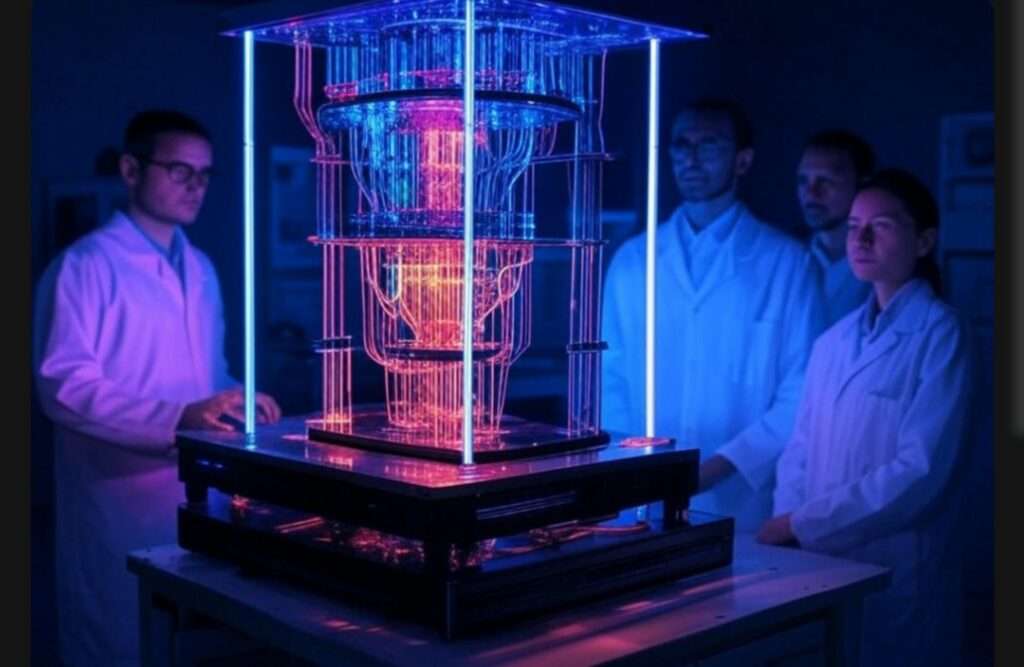Microsoft’s Majorana Quantum Breakthrough
Microsoft’s Quantum Leap: How Majorana Particles Could Change Computing
In recent years, quantum computing has emerged as one of the most fascinating frontiers in technology, and Microsoft’s exploration of Majorana particles represents a groundbreaking advancement in this domain.
Microsoft has brought about a great revolution in quantum computing by utilizing Majorana particles, unlocking a new frontier in computational technology. These special particles hold the potential to create faster, more stable, and error-resistant quantum computers, which could solve problems currently deemed impossible for traditional computers. Imagine a world where complex calculations that take today’s supercomputers years to complete could be solved in mere seconds. This capability could lead to advancements in various sectors including finance, healthcare, and logistics.

What Are Majorana Particles?
Majorana particles are distinguished by their unique property of being their own antiparticles, meaning they can essentially cancel themselves out. This feature is significant because many scientists believe that Majorana particles can be instrumental in the development of topological qubits. These qubits are fundamentally different from conventional quantum bits, offering enhanced stability and resilience against noise and errors. For instance, the Majorana particle could help create a system where qubits are less affected by their environment, thereby reducing errors in computation.
To simplify, traditional quantum computers utilize qubits that are prone to decoherence, resulting in unreliable computations. In contrast, Majorana-based qubits are inherently protected by the laws of physics, making them robust against environmental disturbances. This resilience is pivotal for advancing quantum computing towards practical and widespread applications. For example, while a traditional qubit might drop a calculation after just a few milliseconds, a Majorana qubit could maintain its state for significantly longer, allowing for more complex operations to be performed without interruption.
To simplify, traditional quantum computers utilize qubits that are prone to decoherence, resulting in unreliable computations. In contrast, Majorana-based qubits are inherently protected by the laws of physics, making them robust against environmental disturbances. This resilience is pivotal for advancing quantum computing towards practical and widespread applications.

How Is Microsoft Using Majorana?
Microsoft is at the forefront of research into topological quantum computing through its ambitious Azure Quantum project. The company’s approach starkly contrasts with competitors like Google and IBM, who are pursuing superconducting qubits. Microsoft envisions a future where Majorana particles serve as the foundation for a more fault-tolerant quantum computer. By focusing on Majorana particles, Microsoft aims to harness their unique properties to create a new class of quantum systems that could outperform current technologies.
Unlike traditional qubits that require sophisticated error correction methods, Microsoft aims to leverage Majorana particles to create quantum computers capable of executing long, stable computations with minimal errors. This objective is crucial as current quantum computers often struggle with maintaining coherence over extended periods, hindering their applicability. In practical terms, this means that industries relying on quantum computing for complex simulations could see faster turnaround times and enhanced reliability in results.
Innovations in Financial Modeling: Financial institutions could utilize quantum computing to model complex financial systems, allowing them to simulate various market scenarios and optimize trading strategies in real-time.
Enhanced Security Protocols: The rise of quantum computing could lead to new methods of data encryption that are virtually unbreakable, revolutionizing the field of cybersecurity and protecting sensitive information.
Transforming Climate Modeling: Quantum computers could process vast amounts of environmental data, helping scientists to predict climate changes with greater accuracy and develop strategies to combat climate change.
Personalized Education Technologies: Quantum computing could enable the creation of highly personalized learning experiences, tailoring educational content to individual needs and learning styles.
Why Does Majorana-based Quantum Computers Matter?
If Microsoft successfully realizes Majorana-based quantum computers, the implications could be transformative. The potential applications span numerous industries, promising significant advancements in technology and society:
Powerful AI & Machine Learning: Quantum computers excel at processing vast datasets, which could significantly enhance the development of advanced AI algorithms and machine learning models, facilitating breakthroughs in various fields.
Faster Drug Discovery: With the ability to simulate molecular interactions with unprecedented accuracy, quantum computers could revolutionize the pharmaceutical industry, leading to the rapid discovery and development of new medicines.
New Cryptography Methods: Quantum computing could usher in a new era of ultra-secure communication methods. However, this technology could also pose a threat to current encryption standards, necessitating the development of new cryptographic approaches.
Revolution in Materials Science: The capabilities of quantum computers may enable researchers to design innovative materials, improving technologies such as batteries, superconductors, and even aerospace engineering. For instance, quantum simulations can help discover new materials for more efficient solar panels or to create lighter, stronger materials for aircraft.

Challenges and Future of Majorana Computing
Despite the promising potential of Majorana particles, significant hurdles remain. Scientists must navigate the complexities of scaling these particles for practical applications and must thoroughly verify their stability for real-world usage. Research into this area is ongoing, and breakthroughs are being made regularly. Microsoft’s breakthrough is commendable, yet constructing a fully functional Majorana-based quantum computer will demand considerable investment in research, time, and resources. Encouraging collaboration between academia and industry will be crucial for overcoming these challenges, fostering innovation and accelerating progress.
Despite the promising potential of Majorana particles, significant hurdles remain. Scientists must navigate the complexities of scaling these particles for practical applications and must thoroughly verify their stability for real-world usage. Microsoft’s breakthrough is commendable, yet constructing a fully functional Majorana-based quantum computer will demand considerable investment in research, time, and resources.
Looking forward, if Microsoft leads the charge in making quantum technology practical, stable, and beneficial for industries around the globe, the impact on future generations of users could be profound and transformative. The journey to realizing the true potential of Majorana particles is just beginning, and as research progresses, we may witness revolutionary changes that could redefine what we understand about computing and problem-solving in the 21st century.




